Ever check the news and feel like the world is ending? It’s hard not to feel like the authors of the near-future dystopian novels on this list didn’t feel the same way. At the very least, their books all explore pretty terrifying logical extremes of various aspects of today’s social and political landscape.
Utopias are works that portray an ideal, paradisiacal world. Conversely, dystopias portray worlds with extreme problems, injustices, or other poor conditions. As you might imagine, dystopias come in many shapes and sizes. There are dystopias exploring the impacts of everything from environmental catastrophes or totalitarian regimes to societal collapse, technological implosion, and more.
Interestingly, while they’re supposedly about the future in many ways, most dystopian fiction is really about the contemporary moment and what might happen if we don’t change course. For example, George Orwell’s 1984 was published just four years after the end of World War II and took a good, hard look at civil liberties, surveillance, and totalitarianism. It’s no secret that Orwell modeled the oppressive systems in his book after Nazi Germany and Stalinist Russia, yet the result is a dystopian story world that continues to feel highly relevant in a number of ways.
Some dystopias take place in worlds entirely distinct from our own, or in our world centuries or even millennia down the road. However, many dystopias — like 1984, for instance — are set in alternate versions of our own world. Some are even set in worlds that so closely resemble our own that they feel frightfully close. These are sometimes referred to as near-future dystopias.
Regardless of the type of dystopian work you’re dealing with, the message tends to feel like a warning. A what not to do, if you will, so as to avoid ending up living in a real-life dystopia.
This is one of the great powers of dystopian fiction: it functions as a lens through which we can look at our own moment (whenever that may be) and consider where we’re headed as a society.
The books on this list are of the near-future variety. At the risk of sounding melodramatic, they raise important questions about current issues that it would behove us to consider before it’s too late.
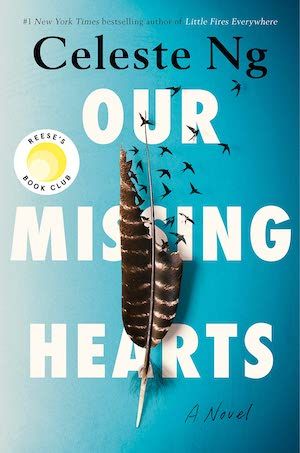
Our Missing Hearts by Celeste Ng
This beautifully rendered novel about censorship, racism, and resistance is uncanny to read during our current moment. It’s hard not to love a novel that features an underground network of librarians connecting subversives to one another, but that’s just a tip of the iceberg with Ng’s latest novel. Bird is an adolescent who misses his mother, and he’s coming to understand that her absence in his life is tied to larger political circumstances. His need to see her again and to find out why she left drives the plot forward as much as it centers the deeply personal impacts of racist policies that masquerade as patriotism. The story of Bird and his family is touching in many ways, even as this novel left me feeling deeply unnerved about the precipice the U.S. seems to be on the edge of right now in terms of the mainstreaming of anti-Asian sentiment and the vitriolic book banning campaigns.
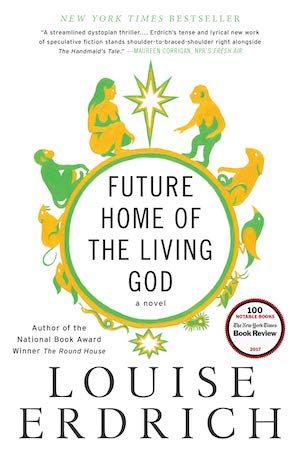
Future Home of the Living God by Louise Erdrich
Okay, at first glance you might be wondering how a novel about evolution reversing itself falls into the category of “near-future dystopian fiction.” Well, it won’t take you long to see how Erdrich’s novel fits the bill because it’s not only about this fascinating premise of flora and fauna (including humans) devolving. It’s also about state control, women’s reproductive rights, and histories of violence and dispossession aimed at BIPOC communities in the U.S. I know, I know, dystopias are about the future, right? But the way Future Home of the Living God tackles history is to underscore the ways a history of mistreatment facilitates contemporary policies that echo the past.

The Farm by Joanne Ramos
Between the intriguing premise and strong writing, The Farm offers a meaningful investigation of the intersections of class, gender, and race. The unsettling “farm” at Golden Oaks is super disturbing: it’s a place where women (disproportionately impoverished immigrants of color) are housed in the finest conditions…as they gestate babies for wealthy clients. Sure, these Hosts get a huge paycheck at the conclusion of their time at the farm, but is it worth it? Ramos’s novel, with its changing narrative perspective, raises thought-provoking questions about economic exploitation (among other things).
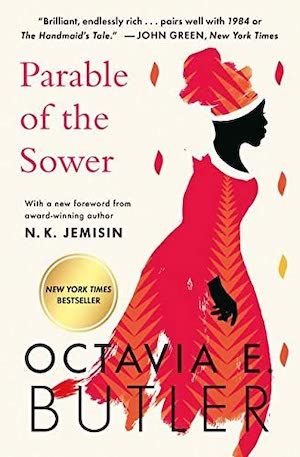
Parable of the Sower by Octavia E. Butler
The first book in Octavia E. Butler’s Parable duology is no less relevant now than it was at the time of its release 30 years ago. Featuring Lauren, a young protagonist living with hyperempathy who’s forced to navigate a world devastated by climate change and a society destroyed by economic collapse, it might even be more relevant today. Throughout the novel, Lauren grows from a tentative girl living within her family’s small, protected community to a young woman embracing her unique and powerful perspective on the world. Butler’s now-classic duology delivers a character whose perspective on society is all too relevant today.
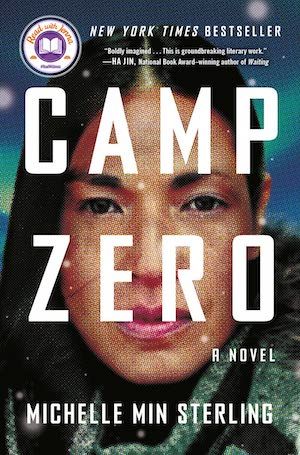
Camp Zero by Michelle Min Sterling
Camp Zero is simultaneously a dystopia about climate change, technology, and heteropatriarchy. That may seem like a lot, and it is (but it’s worth it!). The book’s structure complements this complexity nicely with its interwoven narrative threads and shifting chronology. It’s all too plausible in its portrayal of climate change devastation, and is fittingly set in a remote location in northern Canada. Between female sex workers brought to Camp Zero (like Rose), the men they were brought there for (like Grant), and the rogue collective of women who’ve started their own community nearby (called White Alice), Sterling’s novel will keep you on your toes from start to finish.

Crosshairs by Catherine Hernandez
Heads up: this novel is, frankly, brutal in its insistence on candidly portraying a wide variety of violences against multiple marginalized groups. Despite that, it’s so timely that I had to include it on this list. Hernandez depicts a near-future Canada in which environmental disaster has facilitated a political context in which some of the most vulnerable populations have been incarcerated in camps. It’s an interesting narrative structure, shifting back and forth between past and present, and weaving protagonist Kay’s storyline together with a wide array of other characters’ stories. While the story is at times very direct about its exploration of racism, heteronormativity, ableism, and other forms of discrimination that have risen to the fore in our contemporary moment, the premise and narrative are compelling and will leave you with plenty of material to mull over.
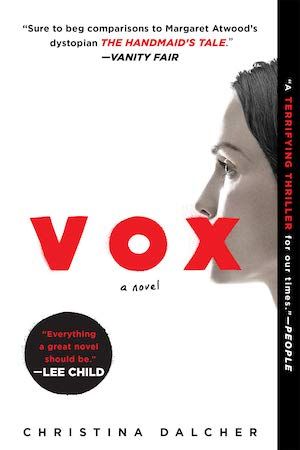
Vox by Christina Dalcher
The premise of Dalcher’s novel is fascinating: with the rise of fundamentalism in the U.S., a daily word limit is imposed on females of all ages. It’s basically as though Twitter’s character limit was codified into law, but for speech. With a 100-word-a-day quota, not to mention other laws that curtail women’s and girls’ freedoms, this near-future dystopia certainly hones in on frightening trends impacting the rights of female-bodied individuals today. The protagonist, Jean, is a mother and a former cognitive linguist (former since women are prohibited from working in Vox) whose expertise leads the government to mandate her help when the president’s brother loses his capacity for speech. The ironies are many, and Jean is an interesting character to watch grapple with the gendered power dynamics in this dystopia.
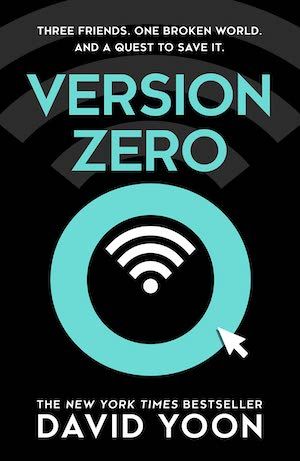
Version Zero by David Yoon
Not just for luddites or technophobes, David Yoon’s foray into sci-fi takes a long, hard look at privacy rights today. Max is quickly becoming disillusioned with the tech industry after landing a job with one of the biggest tech firms in Silicon Valley. When he starts asking the wrong questions about how user data is being used, he finds himself shut out of the entire industry. His decision to team up with his friends and take on the tech giants takes readers on a dramatic ride as the novel explores the dangers of handing over personal information. Ultimately, Yoon’s novel asks important questions about ethics and technology.
